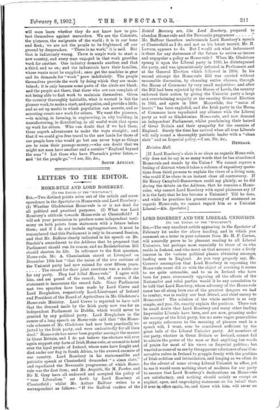LETTERS TO THE EDITOR.
• HOME-RULE AND LORD ROSEBERY.
ETO THE EDITOR OF THE "S1'ECTATOR:1
Sin,---Two distinct points arise out of the article and corre- spondence in the Spectator on Home-rule and Lord Rosebery (1) Whether Gladstonian Home-rule is or is not dead for all political and practical purposes. (2) What was Lord Rosebery's attitude towards Home-rule at Chesterfield ? I will ask your permission to produce some independent testi- mony on both points from statesmen with a future before them; and if I do not include septuagenarians, it must be remembered that this Parliament is only in its second Session, and that Mr. Balfour clearly indicated in his speech on Mr. Sinclair's amendment to the Address that he proposed that Parliament should run its course, and no Redistribution Bill should shorten its life. In reference to the first question, Home-rule, Mr. A. Chamberlain stated at Liverpool on December 18th last "that the union of the two sections of the Unionist party had now existed for over fifteen years.
The record for their joint exertions was a noble one for any party. They had killed Home-rule." I agree with him, and am proud of the record; but, of course, if the statement is inaccurate the record fails. Since Parliament met two speeches have been made by Lord Crewe and Lord Burghclere, respectively Lord-Lieutenant of Ireland and President of the Board of Agriculture in Mr. Gladstone's Home-rule Ministry. Lord Crewe is reported to have said that the demand made by the Irish party new was for an independent Parliament in Dublin, which would never be granted by any political party. Lord Burghclere in the course of a long speech on Herne-rule said that "the Home- rule schemes of Mr. Gladstone had now been practically re- jected by the Irish party, and were undoubtedly for all time dead." Home-rule has never been popular amongst the masses in Great Britain, and I do not believe the electors will ever
• again support any form of Irish Home-rule, or consent to hand 'over the loyal people of Ireland, whose sons have fought and died under our flag in South Africa, to the avowed enemies of our country. Lord Rosebery in his statesmanlike and patriotic speech at Chesterfield demanded "a clean slate," and repudiated the Newcastle programme, of which Home- rule was the first item; and Mr. Asquith, Sir H. Fowler, and Sir E. Grey have all endorsed and accepted the policy of "sane Liberalism" set forth by Lord Rosebery at Chesterfield ; whilst Mr. Arthur Balfour writes to a correspondent as follows; "If the Radical readers of the
Bristol Alercury are, lilse Lord Rosebery, prepared to
PP
abandon Home-rule and the Newcastle programme Mr. Balfour therefore understands Lord Rosebery's speech at Chesterfield as I do, and not as his latest recruit, Mr. H. Lawson, appears to do. But I would ask what inducement is there for any statesman of the future to revive so insane and unpopular a policy as Home-rule ? When Mr. Gladstone sprang it upon the Liberal party in 1886, he disintegrated the party, and was ignominiously defeated in Parliament and at the General Election which followed in 1886. In his second attempt the Home-rule Bill was carried without reasonable discussion, by closuring entire clauses, through the House of Commons by very small majorities ; and after the Bill had been rejected by the House of Lords, the country endorsed their action by giving the Unionist party a large and overwhelming majority at the ensuing General Election in 1895, and again in 1900. Meanwhile, the "union of hearts" has been exploded, and the Irish party in the House of Commons have repudiated any alliance with the Liberal party as well as Gladstonian Home-rule, and now demand an independent Parliament, whilst proclaiming their hatred of Great Britain and their sympathy for the enemies of England. Surely the time has arrived when all true Liberals will rally round a thoroughly patriotic leader with a "clean slate" and an Imperial policy.—I am, Sir, &c., Ha inton Hall.
HENEAGE.
[If Lord Rosebery's slate is so clean as regards Home-rule, why does not he say in so many words that he has abandoned Home-rule and stands by the Union? We cannot repress a feeling of distrust when it takes a column of expository quota- tions from third persons to explain the views of a living man, who could if be chose in an instant close all controversy. If Sir Henry Campbell-Bannerman could say plainly, as he did during the debate on the Address, that he remains a Home- ruler, why cannot Lord Rosebery with equal plainness say (if it is the fact) that he has become a Unionist? Till be does, and while he practises his present economy of statement as regards Home-rule, we cannot regard him as a Unionist Liberal.—ED. Spectator.]










































 Previous page
Previous page